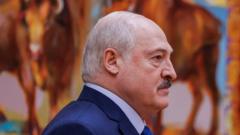With Alexander Lukashenko set to secure his seventh term, Belarusians face a political atmosphere devoid of genuine competition or enthusiasm for elections, raising concerns about the future stability of the nation.
A Stagnant Election Cycle: Belarusians Brace for More of Lukashenko's Rule

A Stagnant Election Cycle: Belarusians Brace for More of Lukashenko's Rule
As Belarus prepares for its 2025 presidential election, a sense of inevitability surrounds Alexander Lukashenko's continuation in power, overshadowed by a backdrop of repression and public indifference.
As Belarus gears up for its presidential election on January 26, 2025, the atmosphere is far from electric; instead, it is marked by a palpable apathy. Drive through Minsk and one might notice the absence of colorful campaign billboards or promotional posters. The somber Belarusian winter, complete with grey skies and sleet, only amplifies the prevailing sense of inertia.
The results of the upcoming election seem predetermined. Alexander Lukashenko, often labeled "Europe's last dictator" after more than three decades of authoritarian rule, is all but assured a seventh term in office. This claim is dismissed as a mockery of democracy by his opponents, yet his supporters insist it is a necessary exercise of "Belarusian democracy."
Lukashenko himself appears to share the public's indifference concerning the elections, stating during a visit to a local plant, "I'm not following the election campaign. I've got no time." This comment came amid lighter moments, as workers humorously gifted him an axe, which he vowed to test out before the election, eliciting applause.
The 2020 presidential election results, which declared Lukashenko the winner with 80% of the votes, incited widespread outrage and massive protests, which were met with brutal crackdowns, leading to the arrest of thousands. The ensuing repression has decimated any strong opposition; many leaders are incarcerated or have fled the country. Consequently, entities such as the European Parliament have denounced the impending election, labeling it a "sham" and highlighting the ongoing severe repression that overshadows even the most basic democratic standards.
Lukashenko's antagonistic perceptions toward opposition figures were evident during a past interview, where he questioned their legitimacy and claimed that an opposition must serve the interests of a considerable populace – a contradiction that reflects his iron grip on power.
While there are four other candidates vying for influence, including the Communist leader Sergei Syrankov, who openly supports Lukashenko while campaigning, their roles seem designed more to legitimize the process than to challenge the incumbent. Syrankov argues for collaboration with the established leader, believing that the country's stability lies firmly in Lukashenko's hands, steering clear any comparisons to the chaos observed in neighboring Ukraine.
Similarly, Oleg Gaidukevich, leader of the Liberal-Democratic Party, candidly acknowledges the certainty of Lukashenko's victory, emphasizing that his party's goal is to solidify their position for future elections.
In small towns like Oktyabrskaya, the public sentiment leans towards a preference for stability, with residents wary of change at the helm. Concerns about plunging into potential chaos resonate with many citizens like Zenaida, who express that a shift in leadership might delay meaningful connections with the international community.
Within Belarus, the collective fear of ambiguity and repression plays to Lukashenko's advantage, as a once-vibrant opposition has been silenced, leaving citizens braced not just for another election but for a continuation of the status quo.





















